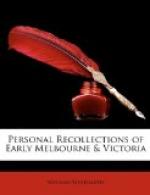We were introduced early to old Gorrie and his nephew McGregor, two doughty Scots, famous—and too famous—in the native hostilities of the last year or two—indeed, ever since these fine runs were taken up. The aboriginal of so fine a country was, at any rate, a primus inter pares of his race, and no way to be despised. The white invaders suffered heavily, in property at least, if not much in their own lives, at the hands of the invaded. Which side was in fault would have been a hard knot to unravel, and probably few on either side troubled themselves much to undo it. Old Gorrie was ever in the thick of war, and duty and inclination went cordially together. He was a cool and terrible shot, and had a terribly long and forcibly arguing rifle. The story goes that, when a couple of pursued marauders had escaped from one covert, and in wild terror were making for another, he quietly waited till they chanced to come in line, and then sent one bullet through both. But he had his cautious and adroit way of telling his doings, as he described to us how, in the turmoil of pursuit, “the gun gaed aff” and “some puir craturs fell.” He had good need, for the authorities had been thoroughly aroused by the occasional atrocities that were sure to arise out of the strong mutual antipathies of the case; and on one occasion, for what seemed a signal case of this kind, involving the massacre of unresisting women as well as men, five colonists were arrested and brought to trial, and would certainly have “swung for it” had there not been some inadequacy of direct evidence.
The next station, Dunmore, was already quite famed for its pattern homestead. I entered its hospitable doorway with a sense of comfort and of the climax of possible squatting attainments such as had never been approached before. “Campbell, McKnight, and Irvine,” “brither Scots” all, and all of them at home at the time, were of the best company, classic or otherwise, alike to one another and to all visitors. Janet, from the kitchen, too, sent us the best oatcakes and other Scotch fare. I always fancy now that such cooks must be called Janet, from lively remembrance of the savoury hotch-potch and sheeps’ head of another Janet at old Robert Sutherland’s, at Egham.
Thence I reached “Burchetts’, of the Emus,” less finished, indeed, but hardly less attractive. They were business clients of my pleasant old friend Charles Barnes, whose name I gave as my pass, with, however, but little need in those open-door days. This was a sheep station, as it was a drier locality, the other stations having been more suited for cattle. We sat joyously chatting in the bright midwinter sunshine. The air was redolent of humour, for which the Burchetts had a name. One of them was rather deaf—indeed very deaf, but when he did pick up the current subject, he seldom failed to contribute good sauce. With regret I remounted next morning, for with business finished in this direction, I was resolved to push on to the Glenelg, as I wished to see through Victoria westwards while I had the opportunity. So I turned my steed north for the Wannon.




